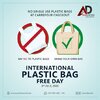Most of us use them every day, the thin plastic bags used by almost every retailer we visit. Whether we’re shopping for groceries, you can almost guarantee that you’ll be leaving the store with a plastic bag stuffed full of your new goodies.
Have you ever stopped to consider what happens to those plastic bags?
Plastic pollution is a global catastrophe and sadly it is a man-made one. Did you know that approximately 500 billion plastic bags are used on a global scale? Just think about how many of these bags will end up littered all over the planet. This is having an extremely detrimental effect on the environment, wildlife and indeed human health.
The marine ecosystem in particular is suffering immensely as a result of plastic pollution. 31 species of marine mammals are known to have ingested marine plastic whilst over 100 species of sea birds have ingested plastic artefacts. Over 250 species have become entangled in plastic, whilst entanglement rates of approximately eight percent have been discovered in some sea lion and seal species.
This pollution is also extremely dangerous because it is leading to the transportation of invasive species, which can have a catastrophic influence on biodiversity. We are not immune from the impact either. Plastic particles in the ocean attract toxins, which in turn affects us, as the toxins enter the food chain.
International Plastic Bag Free Day is dedicated to heightening awareness about these and very real and pressing issues brought about by this most popular of disposable carrying devices. We are reminded that those bags we pick up from the retailers are used for an incredibly short time, usually under 25 minutes, and are then disposed of.
They may pass out of our thinking then, but they do not pass out of our world. Plastic bags remain in the world for anywhere from 100-500 years before finally decaying completely, and have a profound impact upon our environment as a result.
Out in the great reaches of the ocean are massive reefs made up of all sorts of plastic waste, and plastic bags play heavily among them. Such is the magnitude of the problem that these great floating islands reach hundreds of miles, like great monuments to mankind’s wastefulness, and disregard for the world upon which we live. International Plastic Bag Free Day gives us an opportunity to remind ourselves, and others, that every action we take, and every bag we dispose of, effects the lives of everyone in the world for generations to come.
Have you ever stopped to consider what happens to those plastic bags?
Plastic pollution is a global catastrophe and sadly it is a man-made one. Did you know that approximately 500 billion plastic bags are used on a global scale? Just think about how many of these bags will end up littered all over the planet. This is having an extremely detrimental effect on the environment, wildlife and indeed human health.
The marine ecosystem in particular is suffering immensely as a result of plastic pollution. 31 species of marine mammals are known to have ingested marine plastic whilst over 100 species of sea birds have ingested plastic artefacts. Over 250 species have become entangled in plastic, whilst entanglement rates of approximately eight percent have been discovered in some sea lion and seal species.
This pollution is also extremely dangerous because it is leading to the transportation of invasive species, which can have a catastrophic influence on biodiversity. We are not immune from the impact either. Plastic particles in the ocean attract toxins, which in turn affects us, as the toxins enter the food chain.
International Plastic Bag Free Day is dedicated to heightening awareness about these and very real and pressing issues brought about by this most popular of disposable carrying devices. We are reminded that those bags we pick up from the retailers are used for an incredibly short time, usually under 25 minutes, and are then disposed of.
They may pass out of our thinking then, but they do not pass out of our world. Plastic bags remain in the world for anywhere from 100-500 years before finally decaying completely, and have a profound impact upon our environment as a result.
Out in the great reaches of the ocean are massive reefs made up of all sorts of plastic waste, and plastic bags play heavily among them. Such is the magnitude of the problem that these great floating islands reach hundreds of miles, like great monuments to mankind’s wastefulness, and disregard for the world upon which we live. International Plastic Bag Free Day gives us an opportunity to remind ourselves, and others, that every action we take, and every bag we dispose of, effects the lives of everyone in the world for generations to come.


